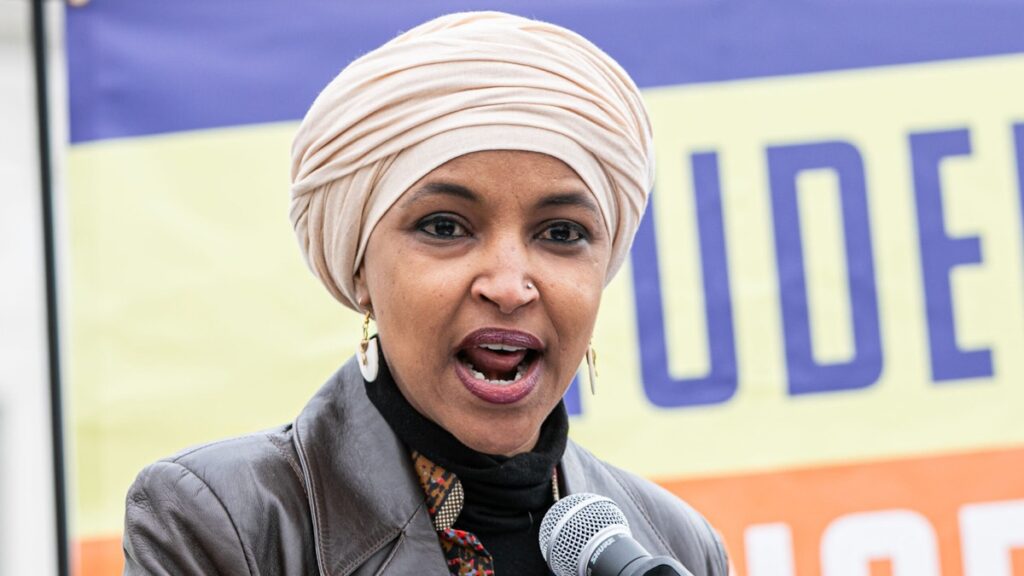The impending visit of Israeli President Isaac Herzog to the U.S. Congress incites rabid dissent in the ranks, as outspoken Congresswoman Ilhan Omar (D-MN) pledges to boycott the address. The announcement of Herzog’s scheduled speech on July 19 sparked an outpouring of vehement sentiment from the controversial lawmaker, despite her later revelation that she had been unaware of his planned visit.
Caught off guard by the query regarding Herzog’s forthcoming address, Omar initially vented her indignation towards the upcoming visit, declaring unapologetically that there was “no way in hell” she would be in attendance. She extended her bombshell reaction by confessing: “I didn’t even know he was coming.” Omar’s record of anti-Semitic rhetoric underpins her audacious response and has triggered notable ripostes from multiple political quarters.
Herzog is more of a figurehead in the country, the president is not part of day to day governance like the PM, I don't think most critics of Israel even have a strong feeling about him.
— Zaid Jilani (@ZaidJilani) July 12, 2023
News Nation reporter Zaid Jilani expressed disbelief at Omar’s intense reaction, questioning: “She didn’t know until the reporter asked but had that strong of feelings about it?” Jilani underscored the largely ceremonial role of the Israeli President, distinct from the operational functions of the Prime Minister. He implied that such a figurehead would usually not provoke strong reactions from critics of Israel.
Rabbi Yaakov Menken echoed the general sentiment, applauding Omar’s self-removal from the event: “She will not be missed…The best possible contribution she could make for American values, tolerance, and decency, is to permanently stay home. Why do Democrats persist in harboring this racist in their midst?” The Rabbi’s comment implies a partisan reticence to address allegations of racism within party lines.
Omar’s allegedly anti-Semitic stance has reached crisis point, triggering a vote by the House of Representatives to oust her from the House Foreign Affairs Committee. A near-unanimous cohort of 218 of the 222 House Republicans voted in favor of her removal, while three abstained, and one, Rep. Dave Joyce (R-OH), merely marked “present.”
She will not be missed. In fact she should make it a habit. The best possible contribution she could make for American values, tolerance, and decency, is to permanently stay home. Why do Democrats persist in harboring this racist in their midst? https://t.co/xYccS5t2a3
— Rabbi Yaakov Menken (@ymenken) July 12, 2023
House GOP leader Kevin McCarthy underscored the seriousness of Omar’s egregious statements, citing examples of her reportedly using anti-Semitic tropes, alleging equivalences between the U.S. military and Islamic terrorist organizations, and her dismissive reference to the tragic September 11 attacks, stating that “some people did something.” McCarthy also charged Omar with failing to express remorse or issue apologies over a litany of objectionable public statements.
Speaker McCarthy addresses the House vote to remove Rep. Ilhan Omar from the Foreign Affairs Committee, saying the move was not "tit for tat."
"We're not removing her from other committees. We just do not believe, when it comes to Foreign Affairs…She shouldn't serve there." pic.twitter.com/Hkm5Xa4kSY
— CBS News (@CBSNews) February 2, 2023
As we approach Herzog’s congressional address, the uproar surrounding Omar’s defiant protest exemplify the contentiousness of the Israeli-US relationship – a diplomatic tightrope fraught with ideological tension and polarized prejudice. The event reveals not only the bitterness of political discourse but also raises questions about democratic values, the limits of free speech, and the blurring intersection of prejudice and policy that continues to agitate political relations. The exclusion of Rep. Ilhan Omar from the speech by her own volition is more than a gesture of protest – it represents a pressing and pervasive issue in our democracy. And as citizens, it compels us to ask – how do we define the boundaries of our democratic ideals in an era where worldviews clash so vehemently within our institutions of power?



